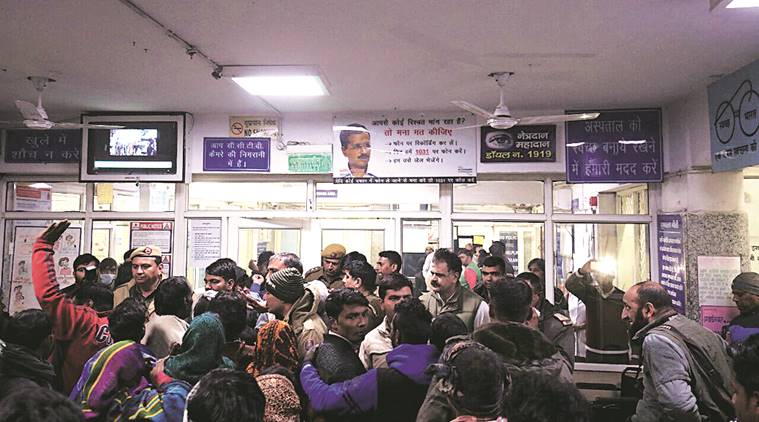Why 10 of 17 dead in Bawana factory fire are women: Take less pay, don’t unionise
"They often don’t ask for too much money, and rarely agitate. Since the work doesn’t require too much physical effort, factory owners don’t want to hire men and pay Rs 9,000-plus," International Federation of Trade Unions general secretary (Delhi) Rajesh Kumar said
 Relatives look for their family members at Maharishi Valmiki Hospital. (Express Photo by Amit Mehra)
Relatives look for their family members at Maharishi Valmiki Hospital. (Express Photo by Amit Mehra)
A poor background, many mouths to feed and not enough options for a better life — these are some of the things that united the 10 women charred to death in the Bawana firecracker unit fire on Saturday night.
Take, for example, 18-year-old Rita, whose body was identified by her brother, Deepu, by her nose ring and bangles. Around 7 am at Rohini’s Dr B R Ambedkar Hospital, as relatives gathered expecting the worst, Deepu said, “She would have been home by 5.30 pm, but decided to do overtime. She earned Rs 5,000-6,000 for eight hours, and about Rs 3,000 more if she did overtime.”
Settling for less than minimum wage is, in fact, why so many women were at the unit, and comprised 10 of the 17 dead. International Federation of Trade Unions general secretary (Delhi) Rajesh Kumar said, “Women are preferred for packaging jobs because they rarely unionise, which makes it easier to exploit them, pay less. They often don’t ask for too much money, and rarely agitate. Since the work doesn’t require too much physical effort, factory owners don’t want to hire men and pay Rs 9,000-plus.”
Amid anger and despair at the hospital, two 10-year-olds, Shruti and Anisa, struck a friendship. While Shruti lost the sole earning member, her 40-year-old mother Baby, Anisa lost her grandmother, Madina, 55. “Mummy woke up early on Saturday, made roti-sabzi, and left for work at 9 am… she usually returns by 9 pm. When I asked relatives, they told me she had been injured at work. Now they say she will never come home,” said Shruti, drawing lines on the dust gathered on a car in the hospital’s parking lot.
Read | Bawana factory fire: A night spent without any sleep — or answers
Madina’s daughter, Mubeena, said, “We used to work together at a water bottle packaging factory. Around 15 days ago, she changed jobs. The earlier one required heavy lifting and she was getting old. My mother and I were the main breadwinners… with her gone, how will I manage alone?”
Nearby, Bantu Lal (45) waited for officials to announce his name so he could recognise his daughter, Sonam (23). “This was her first job… she was due to be married in a few months. She wanted to work, so she could pitch in with the expenses,” said Lal.
Read | Bawana factory fire: The Making of a Tinderbox
Minutes before L-G Anil Baijal and Health Minister Satyendar Jain visited the families, chairs were placed for the relatives. “There has been negligence… police have been directed to wrap up investigation so strict action can be taken. The Chief Minister and I have asked the principal secretary (Home) to set up an inquiry in the case,” said Baijal.
Read | Bawana factory fire: Whose job was it to keep a check? Civic body, AAP pass the buck
Six ambulances left the hospital around noon with the bodies of six women — all residents of Metro Vihar. Outside 35-year-old Afsana’s gali, her four young children and relatives sat in a truck, following the ambulance to her hometown Bulandshahr. “We moved to Delhi two years ago to earn for our children… How do I explain her death to them,” said Mukhtiar, 40, her husband.












